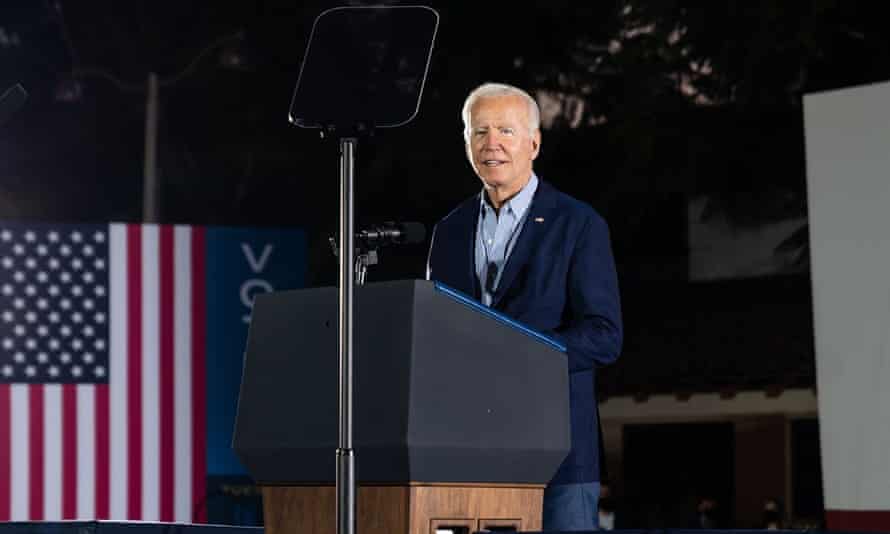Joe Biden to propose target of vaccinating 70% of world in a year
US president’s Covid plan is more ambitious than current performance and targets set at G7 in Cornwall

Last modified on Tue 14 Sep 2021 15.48 BST
Joe Biden will reportedly propose a target for 70% of the world’s population to be vaccinated within the next year at a global vaccines summit he intends to convene alongside the UN general assembly in New York this month.
The US president’s target, reported by the New York Times, is in line with ambitions set jointly by the World Bank, the International Monetary Fund (IMF), the WTO and the World Health Organization (WHO) but is more ambitious than current performance and the targets set at the G7 meeting in Cornwall chaired by the UK prime minister, Boris Johnson. The G7 agreed to donate 870m doses of Covid-19 vaccines directly, with an aim to deliver at least half by the end of 2021.
The west has been repeatedly accused of hoarding surplus vaccines and of moral failure by providing jabs to teenagers or a third set of vaccines to adults when large tracts of Africa remain totally unvaccinated.
The 70% target “is ambitious but consistent with existing targets”, according to the White House.
In June the heads of the World Bank Group, IMF, WHO and World Trade Organization (WTO) set a target of having 60% of the world’s population vaccinated by the middle of 2022.
The US draft also calls for countries “with relevant capabilities” to either purchase or donate 1bn additional doses of coronavirus vaccines, beyond the 2bn that have already been pledged by wealthy nations; and for world leaders to ensure that $3bn (£2.2bn) is made available in 2021 and $7bn in 2022 in financing “for vaccine readiness and administration, combating hesitancy, and procuring ancillary supplies”.
This month the WHO reported that only 20% of people in low- and lower-middle-income countries had received a first dose of vaccine compared with 80% in high- and upper-middle-income countries.
Its latest supply forecast suggested enough vaccines would be released through the Covax mechanism to protect 20% of the population, or 40% of all adults, in all 92 lower-income economies with the exception of India. That assumes 1.4bn doses will have been made available though the Covax mechanism through 2021, a 25% shortfall from its previous projection of 1.9bn.
Explaining the shortfall, the WHO said its ability to protect the most vulnerable people in the world “continues to be hampered by export bans, the prioritisation of bilateral deals by manufacturers and countries, ongoing challenges in scaling up production by some key producers, and delays in filing for regulatory approval”. The WHO supply forecast projects a total of 2.6bn doses will have been released to low-income countries by the end of the first quarter of 2022.
Dependent on a range of factors, including funding, the WHO projects 5.9bn doses can be available by the end of 2022. It has been forced to downgrade its previous forecasts largely due to India’s decision to focus its Serum Institute vaccines on the home market, regulatory delays and unforeseen challenges in scaling up production. South Africa has still only vaccinated 10% of its population.
The slow rate of vaccination in Africa is also caused partly by issues around distributing the vaccines, such as the lack of health infrastructure, funding for medical supplies used during vaccination, and staff. The rate of vaccination in Nigeria, for example, is at 1.7%.
In Cornwall in June, the WHO director general, Dr Tedros Adhanom Ghebreyesus, said if a further 11bn doses were provided, 70% of the world’s population could be vaccinated by the time of the next G7 in Germany. The annual summit is normally held in May or June, so the Biden target of 70% by September would stop short of the WHO request.
The US, under pressure from Chinese vaccine diplomacy, said in August it had delivered 110m Covid-19 vaccine doses to 65 countries, from Afghanistan to Zambia. The US donations proved that “democracies can deliver”, Biden said at the time. He said the US had acquired another 500m Pfizer/BioNTech shots that would be donated to low- and middle-income countries by the end of the month, emphasising that global vaccination was essential: “You can’t build a wall high enough to keep us safe from Covid in other countries.”
Political pressure is also building at the WTO for a relaxation of intellectual property rules for Covid vaccines, first proposed by India and South Africa in October.
More than 140 former world leaders and Nobel laureates, including Gordon Brown, François Hollande, Mary Robinson and Helen Clark, have intervened in the German election by calling on the next chancellor to support an intellectual property waiver at the WTO. Germany has been one of the countries blocking the lifting of the waiver.




Nessun commento:
Posta un commento